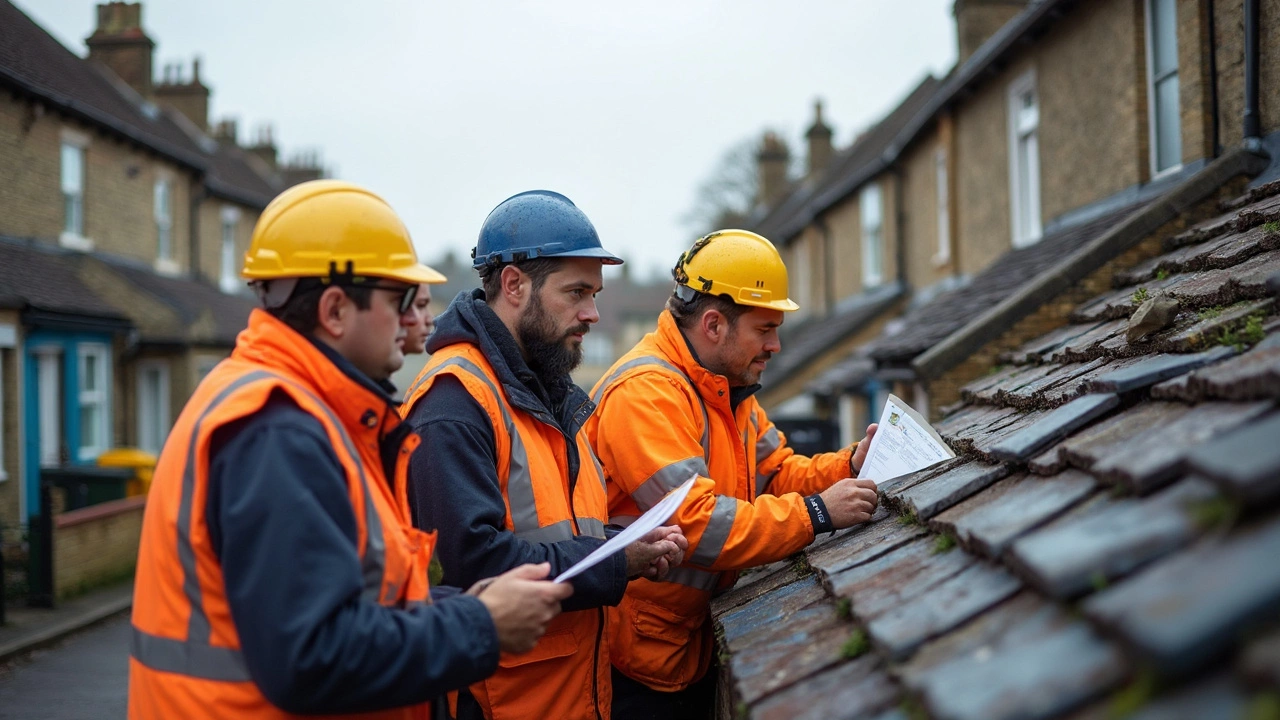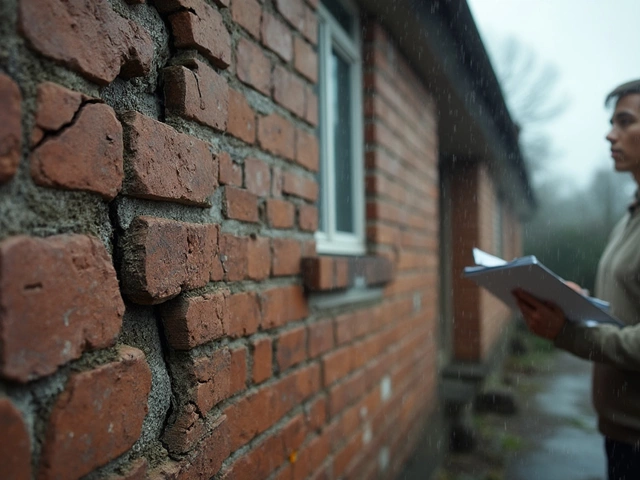
Ever had a roofer toss out the phrase 'cost per square' and wonder if he was talking about math class or your leaky shingles? Here’s the thing—a “square” in roofing world is 100 square feet of material laid out and installed. When you hear roofers talk about price per square, they’re giving you the industry’s standard way of breaking down the job.
Prices can be all over the place. Right now, most roofers in the U.S. charge anywhere from $350 to $900 per square for asphalt shingles. If you want metal, tile, or other fancy stuff, prices head north—sometimes way north. But that number isn’t just pulled out of thin air. There’s more to it, from material costs to roof shape and even how tricky your roof is to work on.
Instead of just accepting any quote, you need to know what goes into those numbers. Knowing the ballpark per square rate gives you confidence, whether you’re patching up a spot Bruno ran across chasing a squirrel, or replacing the whole thing after a brutal hail storm. No guessing, no blind trust—just straight answers so you don’t get ripped off.
- Roofing Costs Per Square Explained
- What Impacts The Price?
- Comparing Quotes: What To Watch Out For
- Getting The Best Deal Without Cutting Corners
Roofing Costs Per Square Explained
Let's clear up what "per square" actually means. In roofing, a square is just 100 square feet. So if your roof is 2,000 square feet, that's 20 squares. When you see a roofer's quote, they're usually talking about how much they’ll charge for each one of those 100-square-foot sections.
The roofing cost per square swings a lot based on where you live, what kind of shingles you pick, and how intense your roof’s layout is. For standard asphalt shingles, most folks in the U.S. can expect to pay anywhere between $350 and $900 per square, installed. That covers tearing off the old shingles, prepping the roof deck, putting down new underlayment, and finally installing the new shingles.
Higher-end jobs are a whole different ball game. Metal roofing? Tile? Those can blast up to $1,400 per square—sometimes even more if you want a wild look or energy-saving extras.
Just so you can see where these numbers come from, here’s a quick rundown:
| Material Type | Cost Per Square (2025) |
|---|---|
| Asphalt Shingles | $350 – $900 |
| Metal | $700 – $1,400 |
| Tile | $800 – $2,000 |
| Wood Shake | $600 – $1,200 |
Keep in mind, these prices include both the materials and the labor—unless your quote says otherwise. If a roofing company pitches you a super low price, ask if it really covers the whole job or if they’re about to hit you with extra fees later. No one likes a surprise when it comes to stuff as expensive as your roof.
What Impacts The Price?
There’s no one-size-fits-all answer when you ask about the cost for a new roof. Several real-world factors swing the price. Let’s break down what actually matters.
First off, material choice makes a huge difference. Standard 3-tab asphalt shingles are the most budget-friendly. Architectural shingles cost more, but they also last longer and look better. Metal, tile, and slate? Those can triple or even quadruple your total bill per square.
The next biggie is your roof’s size and layout. Bigger roofs mean more material and labor hours. If your roof is full of angles, valleys, or has a super steep pitch, expect the quote to climb. Roofers have to work harder and use extra safety measures on tricky rooftops. Flat and simple? That keeps the cost down.
Location matters, too. Labor costs in big cities or areas with higher wages can push the price up, while smaller towns might see lower rates. Plus, prices for materials aren’t the same everywhere since delivery and supply can be local.
- Need an old roof torn off first? That’s extra—usually $75 to $150 per square.
- Got bad plywood or rotted boards under your shingles? Repairs add more cost on top, and you usually don’t see the damage until work starts.
- Permits, waste removal, and project insurance all factor in—most homeowners forget about those line items.
Last, time of year can swing prices, too. Spring and fall are busy seasons, and higher demand sometimes means a higher price tag. Winter could be cheaper, but good luck finding a crew that isn't already booked or willing to battle through snow and ice.
If you want to keep your roofing cost in check, always ask your roofer to explain what’s baked into their rate per square. A legit pro will break down materials, labor, old roof tear-off, and all those details—no guesswork.

Comparing Quotes: What To Watch Out For
Comparing quotes from different roofers is not just about hunting for the lowest price tag. Sometimes, a quote that looks like a steal can turn into a real headache once you dig into the details. Make sure each quote you get clearly spells out what’s included—materials, labor, tear-off, dump fees, permits, warranties, and clean-up. If one roofer’s price per square is way lower than everyone else, ask why. Are they skipping on quality materials, hiring rookies, or leaving out things you’ll get billed for later?
Check what brand and type of shingles they’re offering. If one bid uses premium architectural shingles while another is quoting basic three-tab, that alone can swing the quote by hundreds per square. Also, some roofers sneak extra costs into fine print—think fees for steep roofs, repairs to rotten decking, hauling away old shingles, or last-minute add-ons.
Don’t forget about local licensing and insurance. In most states, legit roofers need to show proof of both. No certificate? That’s a red flag. Getting a cheap deal from an unlicensed guy can cost you way more in the long run, especially if something goes wrong and you’re left footing the bill.
- Always get at least three quotes and ask each roofer to break down costs in writing.
- Ask about warranties—not just for materials, but also for the crew’s workmanship.
- If your area had storms recently, watch out for “storm chasers”—out-of-town crews chasing quick cash and skipping out on guarantees.
- Ask how long they’ve been in business locally. A solid track record in your town means they’re less likely to disappear overnight.
When it comes to choosing someone for any roofers job, trust matters more than just saving a few bucks. Make sure you know what you’re really getting so you don't get blindsided later on.
Getting The Best Deal Without Cutting Corners
So you want the job done right but don’t want to feel like you just bought your roofer a new truck? Here’s how to lock in a fair price and still get quality work.
First, always get at least three written estimates. Don’t just call one guy from the neighborhood who did your cousin’s roof. Get quotes in writing, line by line, so you can compare apples to apples, not apples to mystery fruit. Every real roofing pro should break down material costs, labor, removal of old shingles, and any extra work (like replacing rotten boards or fixing flashing).
Check for proper licensing and insurance. A proper roofer won’t blink if you ask for copies. If a company can’t show their insurance papers, skip them—no job is worth the headache if someone gets hurt or if something goes sideways on your property. And while you’re at it, Google their name. Check reviews on places like Google Maps and the Better Business Bureau. Most folks don’t realize the roofer with the lowest charge per square sometimes racks up complaints about cut corners or surprise change orders.
Material warranties and labor guarantees matter. Ask how long shingles will last and if the company covers leaks or mistakes for a certain number of years. Some roofs come with a 25-year manufacturer warranty but only a 5-year labor warranty—big difference if there’s a problem. Write everything down. Handshakes and texts are not contracts.
Don’t pay it all upfront. Pay a deposit (usually 10-20%), but save the rest until you see the finished job. If a roofer wants the whole amount before starting, walk away. Good pros buy on account at supply houses, so a giant deposit is a red flag. Need proof? According to the National Roofing Contractors Association, reputable roofers never ask for full payment in advance.
| Payment Stage | Percentage Due |
|---|---|
| Deposit (to schedule job) | 10% - 20% |
| Midway (after tear-off, before new shingles) | 40% - 50% |
| Completion (after final inspection) | 30% - 50% |
One last pro tip: don’t let price be your only guide. If someone bids way lower than everyone else, they’re either hungry for work—or about to skip steps. Saving a few hundred bucks now isn’t worth leaking ceilings or chasing a vanished contractor.
If you remember just one thing, let it be this: focus on finding roofers with a track record, clear paperwork, and a fair bid. That’s how you get value, not just a low number.




